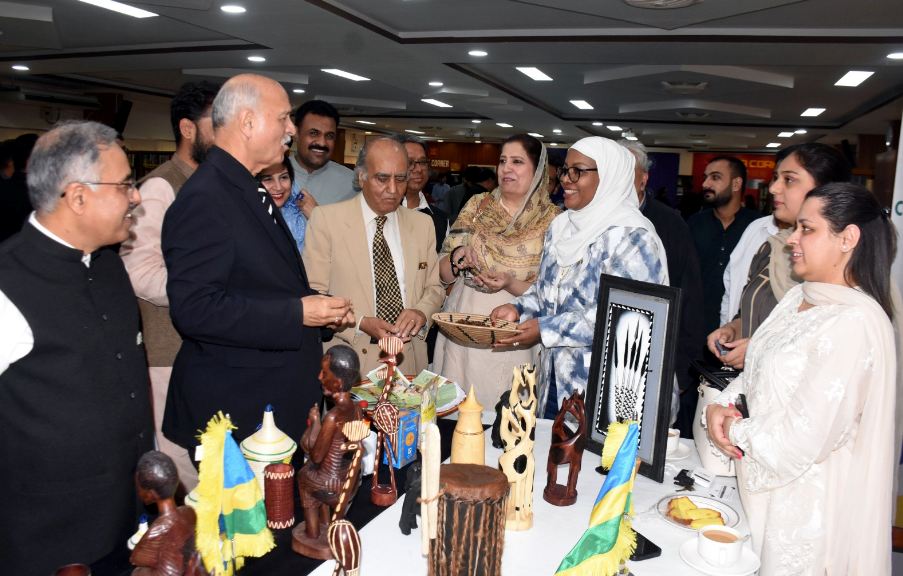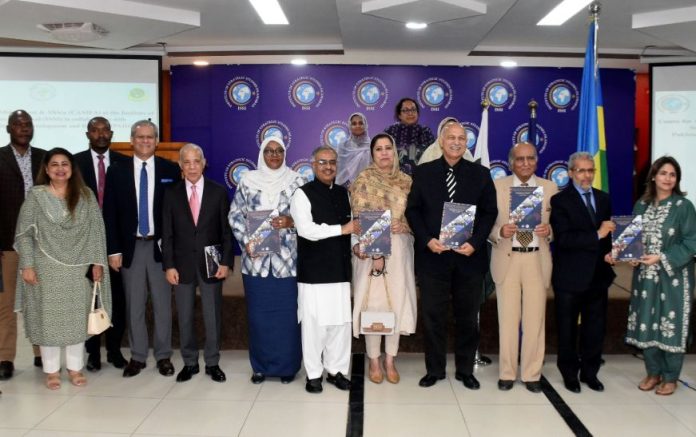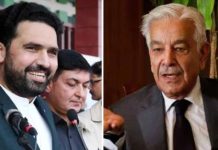ISLAMABAD, JUN 27 /DNA/ – The Centre for Afghanistan, Middle East & Africa (CAMEA) at the Institute of Strategic Studies Islamabad (ISSI), in collaboration with Pakistan Africa Institute for Development and Research (PAIDAR), organized an event to commemorate Rwanda’s Liberation Day. The proceedings, which began with the national anthems of Pakistan and Rwanda, were moderated by Ms. Amina Khan, Director CAMEA. Speakers included Ambassador Sohail Mahmood, Director General ISSI; Ms. Harerimana Fatou, High Commissioner of Rwanda to Pakistan; Mr. Muhammad Naeem Khan, High Commissioner of Pakistan to Rwanda; Lt Col Shyaka Kajugiro Ismail, Defence Attache, High Commission of Rwanda to Pakistan; Ambassador Khalid Mahmood, Chairman BOG ISSI. The Chief Guest on the occasion was Senator Mushahid Hussain Sayed, President PAIDAR, and the Keynote Speaker was Ambassador Hamid Asghar Khan, Additional Secretary (Africa), Ministry of Foreign Affairs Pakistan (MOFA).

Senator Mushahid Hussain Sayed, in his remarks, emphasized the significance of commemorating Rwanda’s Liberation Day, not only as a moment of national pride, but as a tribute to the resilience and strength of the Rwandan people. He praised President Paul Kagame and Rwanda’s leadership for their critical role in unifying the country and steering it toward progress after the 1994 genocide, which the Rwandan nation courageously ended through its own efforts. Reflecting on global injustices, he noted that the world has witnessed three major genocides in the last three decades– Rwanda, Bosnia, and the ongoing one in Gaza and highlighted the double-standards of the international system. He commended the growing Pakistan–Rwanda relationship in diverse areas from political to economic to defence, and called for deeper South-South cooperation, underscoring the potential for enhanced engagement between Pakistan, Rwanda, and the broader African continent.
Ambassador Sohail Mahmood, Director General ISSI, recalled the tragic events of the 1994 genocide against the Tutsi community and noted that Rwanda’s Liberation Day stands as a solemn reminder of that painful chapter, as well as a powerful symbol of the country’s journey towards healing, reconciliation, and national transformation. Ambassador Sohail Mahmood commended Rwanda’s success in fostering inclusive governance, digital advancement, social cohesion, and sustainable development, highlighting its reputation as a model of post-conflict recovery and institutional reform. He underlined Pakistan’s admiration for Rwanda’s progress and reaffirmed the significance of Pakistan’s diplomatic outreach to Africa within the framework of “Engage Africa” policy. He noted that the milestones like mutual establishment of each other’s resident missions mark a shared commitment to expanding bilateral ties in sectors such as trade, agriculture, higher education, healthcare, technology, and professional training. Referring to the recent visit of Honourable Foreign Minister Olivier J. P. Nduhungirehe to Islamabad, during which he also visited ISSI and delivered a talk on Rwanda’s role in Africa’s transformation, Ambassador Sohail Mahmood welcomed the growing momentum in bilateral relations and stressed the importance of sustained dialogue and cooperation. He also highlighted Pakistan’s longstanding contribution to UN peacekeeping in Africa, including in Rwanda, as part of its commitment to peace, stability, and progress on the continent.
Ambassador Hamid Asghar called the Rwandan genocide a failure of the UN system, with its legacy echoed in Gaza today. He praised Rwanda’s resilience and development under President Kagame and expressed Pakistan’s interest in deeper ties. He welcomed recent diplomatic steps and highlighted opportunities for cooperation in education, IT, tourism, and industry.
Ms. Amina Khan, Director CAMEA, highlighted Rwanda’s Liberation Day as a symbol of resilience and transformation, drawing parallels with Gaza’s humanitarian crisis. She reaffirmed Pakistan’s commitment to Africa through the ‘Engage Africa’ policy and CAMEA’s ongoing efforts to foster inclusive dialogue and cooperation.
Ms. Harerimana Fatou highlighted Rwanda’s transformation since the 1994 Genocide into a peaceful, resilient, and progressive nation. She emphasized the deepening Rwanda–Pakistan relationship, marked by diplomatic missions and MoUs in key sectors. She thanked Pakistan for its hospitality and expressed commitment to expanding cooperation in trade, education, and tourism.
Mr. Naeem Khan noted the growing strength of Pakistan-Rwanda relations, marked by a rise in trade from $34 million to $127 million and a growing Pakistani community in Rwanda. He highlighted high-level visits, business delegations, and scholarships for Rwandan students as key drivers of deeper economic, cultural, and educational ties, reflecting the strong mutual commitment to enhanced cooperation.
Lt Col Shyaka Kajugiro Ismail recalled Rwanda’s long history of kingship and the struggle for liberation, marking the 31st anniversary with a reminder of the international community’s failure during the 1994 genocide. He underscored the vital role of national leadership in guiding Rwanda from tragedy to unity and renewal.
Ambassador Khalid Mahmood, in his vote of thanks, recalled the 1994 genocide as one of Africa’s darkest chapters, with nearly a million lives lost. He praised Rwanda’s progress in poverty reduction, economic growth, and its leading role in UN peacekeeping, particularly in promoting women’s participation. He expressed confidence in Rwanda’s resilience to overcome future challenges.=DNA
============

















